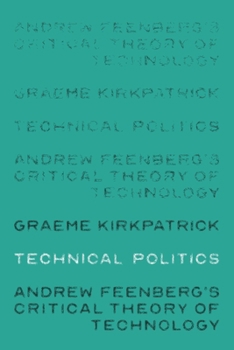Technical Politics: Andrew Feenberg's Critical Theory of Technology
Technology often plays an ambiguous role in theories of social change. Viewed by Karl Marx as the driving force of historical progress, it has come to be associated with exploitation and alienation, thanks in large part to the work of Frankfurt School critical theorists such as Theodor Adorno and Max Horkheimer.
Andrew Feenberg is an unusual figure: a critical theorist with an essentially optimistic view of technology. His concept of 'technical politics' puts technology design at the heart of disputes over the future shape of society. This book provides the first sustained critique of Feenberg's work, describing how it has developed from the tradition of Marx and Marcuse and analysing the key ideas of formal bias, ambivalence, progressive rationalisation and primary and secondary instrumentalisation. Identifying the limitations resulting from Feenberg's attachment to critique, the book offers a utopian corrective that can provide a fuller account of the process of willed technological transformation and of the author's own idea of a technologically authorised socialism. An electronic edition of this book is freely available under a Creative Commons (CC BY-NC-ND) licence.Format:Hardcover
Language:English
ISBN:1526105322
ISBN13:9781526105325
Release Date:May 2020
Publisher:Manchester University Press
Length:176 Pages
Weight:0.94 lbs.
Dimensions:0.4" x 6.1" x 9.2"
Related Subjects
Philosophy Political Science Politics & Social Sciences Social Science Social SciencesCustomer Reviews
0 rating





